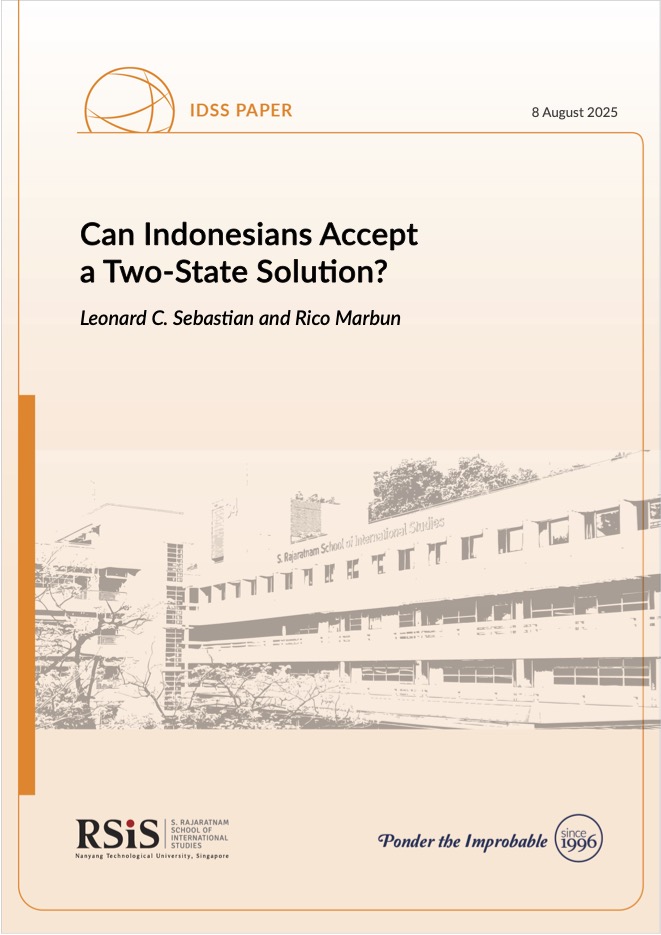08 August 2025
- RSIS
- Publication
- RSIS Publications
- IP25080 | Can Indonesians Accept a Two-State Solution?
SYNOPSIS
A recent survey provides a snapshot of the potential size of the constituency in Indonesia that would support a two-state solution and the normalisation of ties with Israel, and the impact of ongoing conflicts on public sentiments.
COMMENTARY
The war in Gaza as well as its humanitarian crisis has been evident in President Prabowo Subianto’s Middle East tour agenda, which took him to the United Arab Emirates, Turkey, Egypt, Qatar and Jordan along with a two-day visit to Saudi Arabia.
During these overseas visits, which took place earlier this year, Prabowo reiterated Indonesia’s long-standing support for Palestinian independence, maintaining that the existence of two independent states, Palestine and Israel, will be the only viable path to a lasting peace.
Standing beside French President Emmanuel Macron during the latter’s state visit to Indonesia on 28 May, Prabowo uttered his boldest statement yet in support of a two-state solution: “Once Palestine gains Israeli recognition, Indonesia will be ready to open diplomatic relations with Israel.”
The two-state solution is no longer just a means to stop the decades-long violence. Israel’s recognition of a Palestinian state is a pre-condition for Indonesia’s normalisation of diplomatic ties with Israel.
It is the clearest policy statement yet by an Indonesian president on the normalisation of ties between Indonesia and Israel. Even the late President Soeharto, who dominated the political scene for 32 years, had qualms about the normalisation issue, fearing that it would lead to a backlash from the Muslim community.
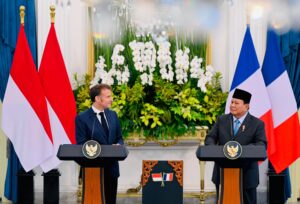
Prabowo’s statement beside Macron was made in Indonesia. This is symbolic because he was talking directly to his political base, possibly with an eye to the 2029 presidential elections. Learning the lessons from the 2017 Jakarta gubernatorial election, and the 2014, 2019 and 2024 presidential elections, he knows that his political base includes a strong percentage of voters, who support political Islam and whose natural inclination may reject any attempt to normalise Indonesia’s relationship with Israel.
Understanding Indonesian Opinion
To test the waters, MEDIAN, a Jakarta-based survey and research company conducted a national survey from 12 to 18 June 2025 to gauge public sentiment towards Prabowo’s statement. The survey collected 907 samples distributed randomly in 38 provinces through social media.
The following line of questioning was adopted: Do Indonesians follow developments in the Middle East closely? How do they process the information? How do they perceive the two-state solution? And will they support the normalisation of relations with Israel under the conditions set forth by President Prabowo?
Heavy Attention on Middle East Issues
The findings reveal that a high percentage of the Indonesian public are avid consumers of news concerning the Middle East: 31% follow the news 5–6 days a week, with 20% keeping tabs on the news every day, while 10% check the news 2–4 days a week, and 10% just once a week (Figure 1). This suggests that more than 50% of the public keep a close watch on developments in the Middle East, and with the Palestine-Israel conflict in the forefront of the news from the region, it would suggest that the issue is of paramount interest to the public.

The majority of the people polled seem to get their information from social media: while 40% claimed they obtain news from TV, 30.5% cited TikTok as their news source, 28.2% cited YouTube, 27% cited Facebook, and 25% cited Instagram (Figure 2). It is also possible that the people polled obtain information from both the mainstream media and social media, but the preponderance of social media as a news source will have an impact on the quality of the information absorbed by the public. They take in filtered rational information, but also unverified and emotional content.
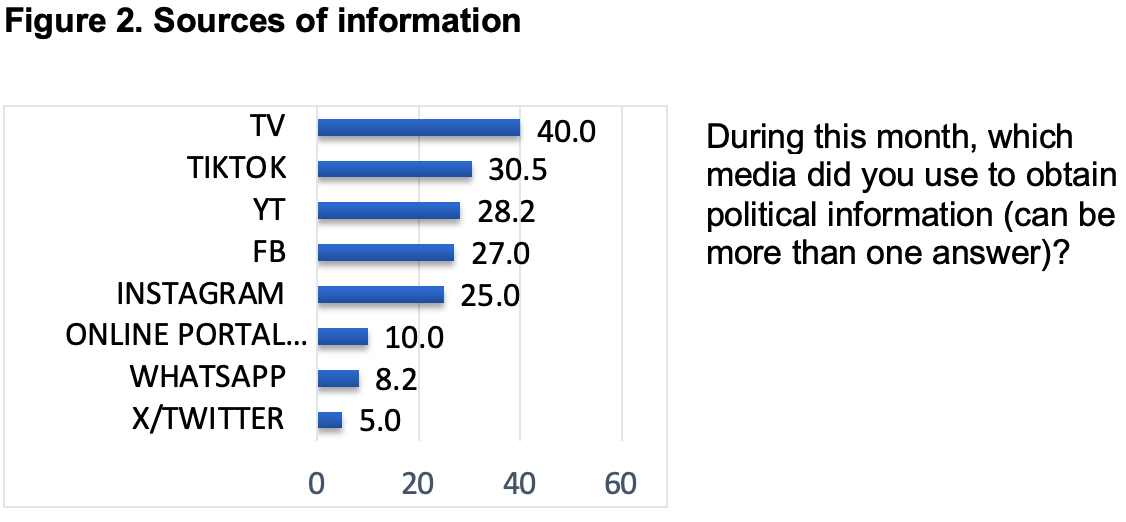
What is the Acceptance Trend for a Two-State Solution?
How do Indonesians perceive the two-state solution? And how many support the idea? To explore this question, MEDIAN conducted two surveys (sample size of 900) in February and June 2025. The initial survey was promising when it came to support for a two-state solution, but the more recent trend in late June showed signs of decline (Figure 3).
The February survey highlighted that 56.9% claimed that only Palestine had the right to have a state, with 40.5% supporting the idea that both Israel and Palestine had the right to have a state, while none supported the idea that only Israel had the right to have a state.
Although 56.9%, or the majority of those polled, chose not to support Israel’s right to have a state, let us not underestimate the significance of the 40.5% proportion of Indonesians who support the right of both Israel and Palestine to have a state.
Considering the Muslim demographics, which is around 87%, converting this percentage to real numbers will suggest that tens of millions of Indonesian Muslims agree with the idea of a Palestinian state and an Israeli state existing side by side. Based on this assumption, a sizeable proportion of Indonesian Muslims would support a two-state solution.
However, in June, there was a decline in public sentiment: support for a two-state solution shrank to 30.2% within just four months. What happened?
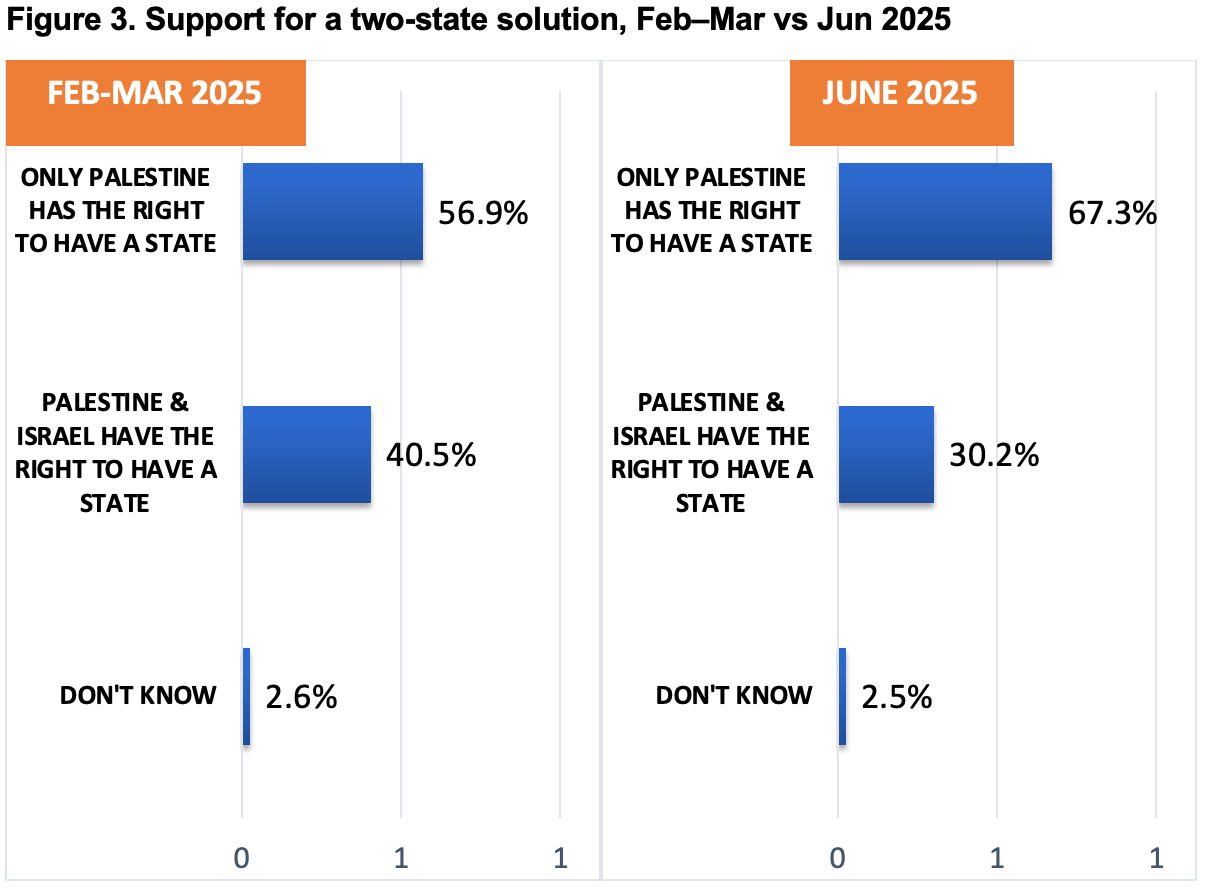
Pragmatic Peace
A closer look at the February data, focusing on those who agreed with the two-state idea and their reasons for supporting it, suggests that Indonesian Muslims prefer an approach that prioritises practical solutions and real-world effectiveness over rigid thinking (Figure 4).
The percentage of respondents who believed in equal rights for both the Palestinians and the Israelis to have a state was 43.6%. In fact, 28.4% stated that if Israel and Palestine could achieve statehood, it would end the long conflict and create peace, with 15.2% stating that a two-state solution is a fair choice for both, and 2.9% stating that statehood was a route to international justice, considering the Palestinian casualty figures.
The sum total of the above three answers means that, at 46.5%, they represent the pragmatic core of Muslims in Indonesia. The February survey suggests that a percentage of Indonesians are no longer yoked to the anti-colonialist narrative when viewing the Palestine-Israel conflict in that Israel has no right to the land as they are the colonisers. This group appears pragmatic enough to accept solutions that could end the conflict, even if it means acknowledging Israel’s right to statehood.
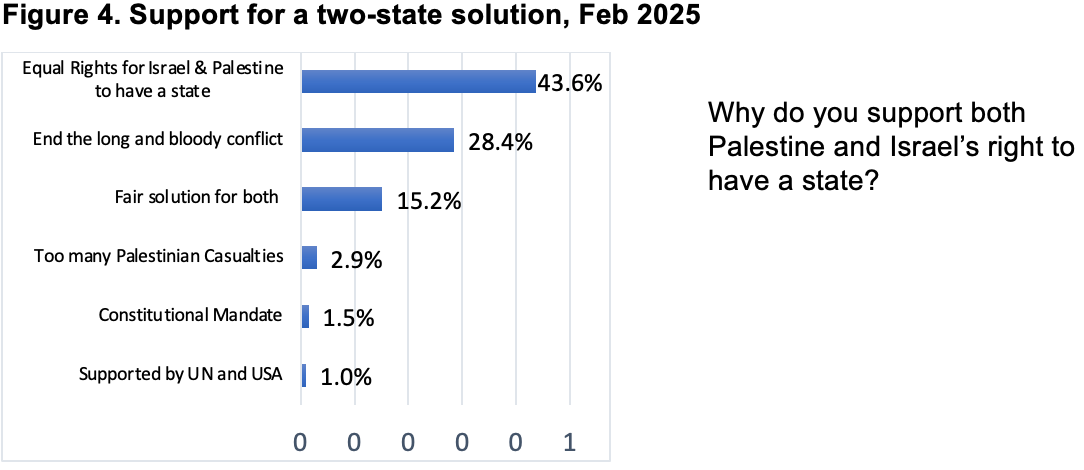
Yet, for the June survey, supporters of a two-state solution dropped to 30.2%, while those supporting the proposition that only Palestine has the right to have a state increased to 67.3% (Figure 3).
Respondents were asked to choose between three questions: (1) Should Indonesia recognise and normalise relations with Israel with no conditions? (2) Could Indonesia recognise and normalise relations with Israel under certain conditions? (3) Should Indonesia never recognise and establish diplomatic relations with Israel?
The June findings are that 74.9% would choose the position that Indonesia must never normalise relations with or recognise Israel, with only 20.7% accepting that Indonesia may normalise relations, subject to conditions (Figure 5).
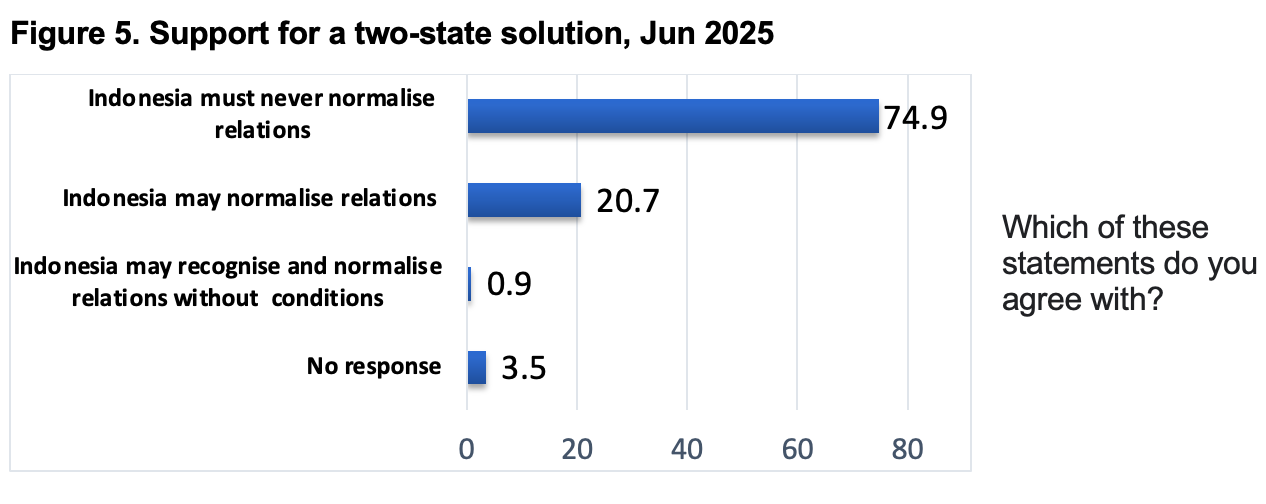
Killing the Pragmatic Peace
Why then, is there declining support for a two-state solution and the normalisation of Indonesia-Israel diplomatic ties? Respondents pointed to the latest round of conflict as the culprit, with 7.8% of respondents calling for an immediate end to the war in Gaza, 5% mentioning the need for Israel to cease attacking Iran, and 3.3% wanting Israel to stop attacking its neighbours (Figure 6).
In total, around 16.1% of respondents were influenced by Israel’s decision to launch attacks on Iran and the continued conflict in Gaza. The survey was conducted from 12 to 18 June. Hence, the latest survey likely captures the public mood towards Israel’s attack on Iran and the continued conflict in Gaza. This decision likely has had the effect of reducing the percentage of Indonesians willing to support a pragmatic peace.
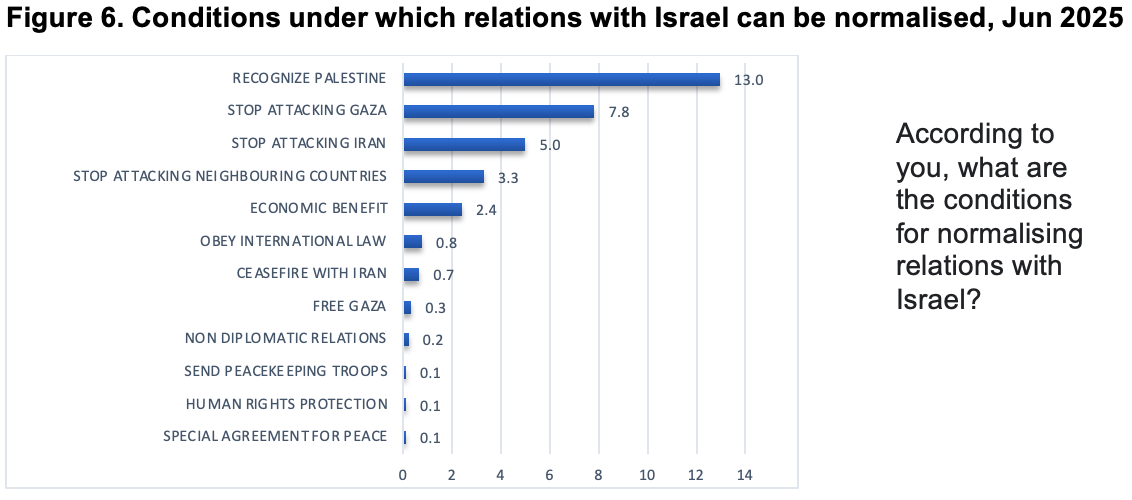
Political Solution versus Zero-Sum Game
The surveys suggest that tens of millions of Indonesians living in the world’s biggest Muslim majority country may recognise the right of Israel to have a state and accept the normalisation of diplomatic ties with Israel under certain conditions. Yet this belief is on thin ice if the conflicts continue.
Overall, there is a sizeable segment of the Indonesia population (even though this is becoming smaller) that is open to the idea of a two-state solution and may even support the possibility of normalising ties with Israel. The data also indicates a substantial constituency that could support Prabowo’s statement to link Israel’s recognition of the Palestinian state as a condition for the normalisation of ties between Indonesia and Israel. However, Israel’s strategy in Gaza, that goes well beyond defeating an opponent, and the attacks on Iran, now means that the greater danger for Prabowo is the loss of political support from his political Islam constituency if he pushes the issue.
Leonard C. Sebastian is Senior Fellow, Indonesia Programme, S. Rajaratnam School of International Studies (RSIS). Rico Marbun is Executive Director of National Media Survey (MEDIAN), Jakarta, Indonesia.
SYNOPSIS
A recent survey provides a snapshot of the potential size of the constituency in Indonesia that would support a two-state solution and the normalisation of ties with Israel, and the impact of ongoing conflicts on public sentiments.
COMMENTARY
The war in Gaza as well as its humanitarian crisis has been evident in President Prabowo Subianto’s Middle East tour agenda, which took him to the United Arab Emirates, Turkey, Egypt, Qatar and Jordan along with a two-day visit to Saudi Arabia.
During these overseas visits, which took place earlier this year, Prabowo reiterated Indonesia’s long-standing support for Palestinian independence, maintaining that the existence of two independent states, Palestine and Israel, will be the only viable path to a lasting peace.
Standing beside French President Emmanuel Macron during the latter’s state visit to Indonesia on 28 May, Prabowo uttered his boldest statement yet in support of a two-state solution: “Once Palestine gains Israeli recognition, Indonesia will be ready to open diplomatic relations with Israel.”
The two-state solution is no longer just a means to stop the decades-long violence. Israel’s recognition of a Palestinian state is a pre-condition for Indonesia’s normalisation of diplomatic ties with Israel.
It is the clearest policy statement yet by an Indonesian president on the normalisation of ties between Indonesia and Israel. Even the late President Soeharto, who dominated the political scene for 32 years, had qualms about the normalisation issue, fearing that it would lead to a backlash from the Muslim community.

Prabowo’s statement beside Macron was made in Indonesia. This is symbolic because he was talking directly to his political base, possibly with an eye to the 2029 presidential elections. Learning the lessons from the 2017 Jakarta gubernatorial election, and the 2014, 2019 and 2024 presidential elections, he knows that his political base includes a strong percentage of voters, who support political Islam and whose natural inclination may reject any attempt to normalise Indonesia’s relationship with Israel.
Understanding Indonesian Opinion
To test the waters, MEDIAN, a Jakarta-based survey and research company conducted a national survey from 12 to 18 June 2025 to gauge public sentiment towards Prabowo’s statement. The survey collected 907 samples distributed randomly in 38 provinces through social media.
The following line of questioning was adopted: Do Indonesians follow developments in the Middle East closely? How do they process the information? How do they perceive the two-state solution? And will they support the normalisation of relations with Israel under the conditions set forth by President Prabowo?
Heavy Attention on Middle East Issues
The findings reveal that a high percentage of the Indonesian public are avid consumers of news concerning the Middle East: 31% follow the news 5–6 days a week, with 20% keeping tabs on the news every day, while 10% check the news 2–4 days a week, and 10% just once a week (Figure 1). This suggests that more than 50% of the public keep a close watch on developments in the Middle East, and with the Palestine-Israel conflict in the forefront of the news from the region, it would suggest that the issue is of paramount interest to the public.

The majority of the people polled seem to get their information from social media: while 40% claimed they obtain news from TV, 30.5% cited TikTok as their news source, 28.2% cited YouTube, 27% cited Facebook, and 25% cited Instagram (Figure 2). It is also possible that the people polled obtain information from both the mainstream media and social media, but the preponderance of social media as a news source will have an impact on the quality of the information absorbed by the public. They take in filtered rational information, but also unverified and emotional content.

What is the Acceptance Trend for a Two-State Solution?
How do Indonesians perceive the two-state solution? And how many support the idea? To explore this question, MEDIAN conducted two surveys (sample size of 900) in February and June 2025. The initial survey was promising when it came to support for a two-state solution, but the more recent trend in late June showed signs of decline (Figure 3).
The February survey highlighted that 56.9% claimed that only Palestine had the right to have a state, with 40.5% supporting the idea that both Israel and Palestine had the right to have a state, while none supported the idea that only Israel had the right to have a state.
Although 56.9%, or the majority of those polled, chose not to support Israel’s right to have a state, let us not underestimate the significance of the 40.5% proportion of Indonesians who support the right of both Israel and Palestine to have a state.
Considering the Muslim demographics, which is around 87%, converting this percentage to real numbers will suggest that tens of millions of Indonesian Muslims agree with the idea of a Palestinian state and an Israeli state existing side by side. Based on this assumption, a sizeable proportion of Indonesian Muslims would support a two-state solution.
However, in June, there was a decline in public sentiment: support for a two-state solution shrank to 30.2% within just four months. What happened?

Pragmatic Peace
A closer look at the February data, focusing on those who agreed with the two-state idea and their reasons for supporting it, suggests that Indonesian Muslims prefer an approach that prioritises practical solutions and real-world effectiveness over rigid thinking (Figure 4).
The percentage of respondents who believed in equal rights for both the Palestinians and the Israelis to have a state was 43.6%. In fact, 28.4% stated that if Israel and Palestine could achieve statehood, it would end the long conflict and create peace, with 15.2% stating that a two-state solution is a fair choice for both, and 2.9% stating that statehood was a route to international justice, considering the Palestinian casualty figures.
The sum total of the above three answers means that, at 46.5%, they represent the pragmatic core of Muslims in Indonesia. The February survey suggests that a percentage of Indonesians are no longer yoked to the anti-colonialist narrative when viewing the Palestine-Israel conflict in that Israel has no right to the land as they are the colonisers. This group appears pragmatic enough to accept solutions that could end the conflict, even if it means acknowledging Israel’s right to statehood.

Yet, for the June survey, supporters of a two-state solution dropped to 30.2%, while those supporting the proposition that only Palestine has the right to have a state increased to 67.3% (Figure 3).
Respondents were asked to choose between three questions: (1) Should Indonesia recognise and normalise relations with Israel with no conditions? (2) Could Indonesia recognise and normalise relations with Israel under certain conditions? (3) Should Indonesia never recognise and establish diplomatic relations with Israel?
The June findings are that 74.9% would choose the position that Indonesia must never normalise relations with or recognise Israel, with only 20.7% accepting that Indonesia may normalise relations, subject to conditions (Figure 5).

Killing the Pragmatic Peace
Why then, is there declining support for a two-state solution and the normalisation of Indonesia-Israel diplomatic ties? Respondents pointed to the latest round of conflict as the culprit, with 7.8% of respondents calling for an immediate end to the war in Gaza, 5% mentioning the need for Israel to cease attacking Iran, and 3.3% wanting Israel to stop attacking its neighbours (Figure 6).
In total, around 16.1% of respondents were influenced by Israel’s decision to launch attacks on Iran and the continued conflict in Gaza. The survey was conducted from 12 to 18 June. Hence, the latest survey likely captures the public mood towards Israel’s attack on Iran and the continued conflict in Gaza. This decision likely has had the effect of reducing the percentage of Indonesians willing to support a pragmatic peace.

Political Solution versus Zero-Sum Game
The surveys suggest that tens of millions of Indonesians living in the world’s biggest Muslim majority country may recognise the right of Israel to have a state and accept the normalisation of diplomatic ties with Israel under certain conditions. Yet this belief is on thin ice if the conflicts continue.
Overall, there is a sizeable segment of the Indonesia population (even though this is becoming smaller) that is open to the idea of a two-state solution and may even support the possibility of normalising ties with Israel. The data also indicates a substantial constituency that could support Prabowo’s statement to link Israel’s recognition of the Palestinian state as a condition for the normalisation of ties between Indonesia and Israel. However, Israel’s strategy in Gaza, that goes well beyond defeating an opponent, and the attacks on Iran, now means that the greater danger for Prabowo is the loss of political support from his political Islam constituency if he pushes the issue.
Leonard C. Sebastian is Senior Fellow, Indonesia Programme, S. Rajaratnam School of International Studies (RSIS). Rico Marbun is Executive Director of National Media Survey (MEDIAN), Jakarta, Indonesia.



